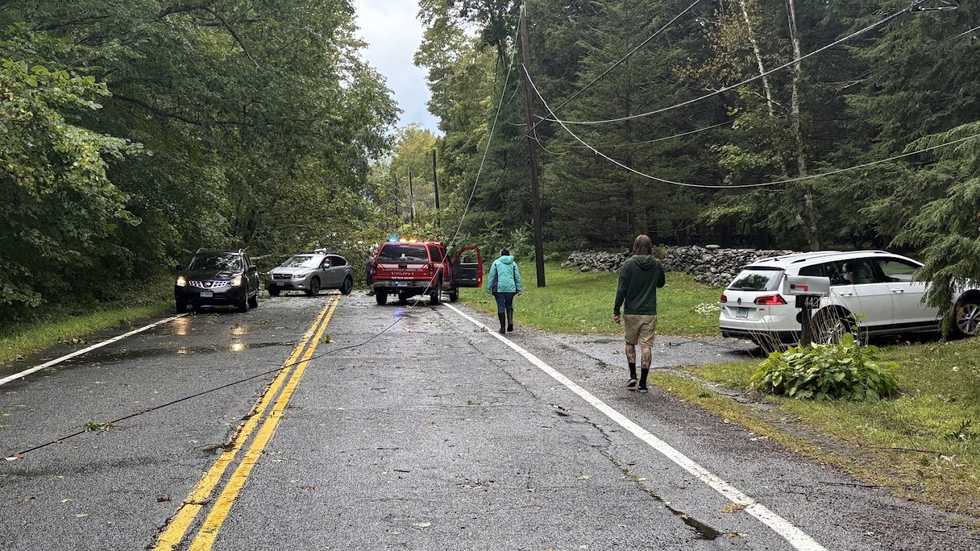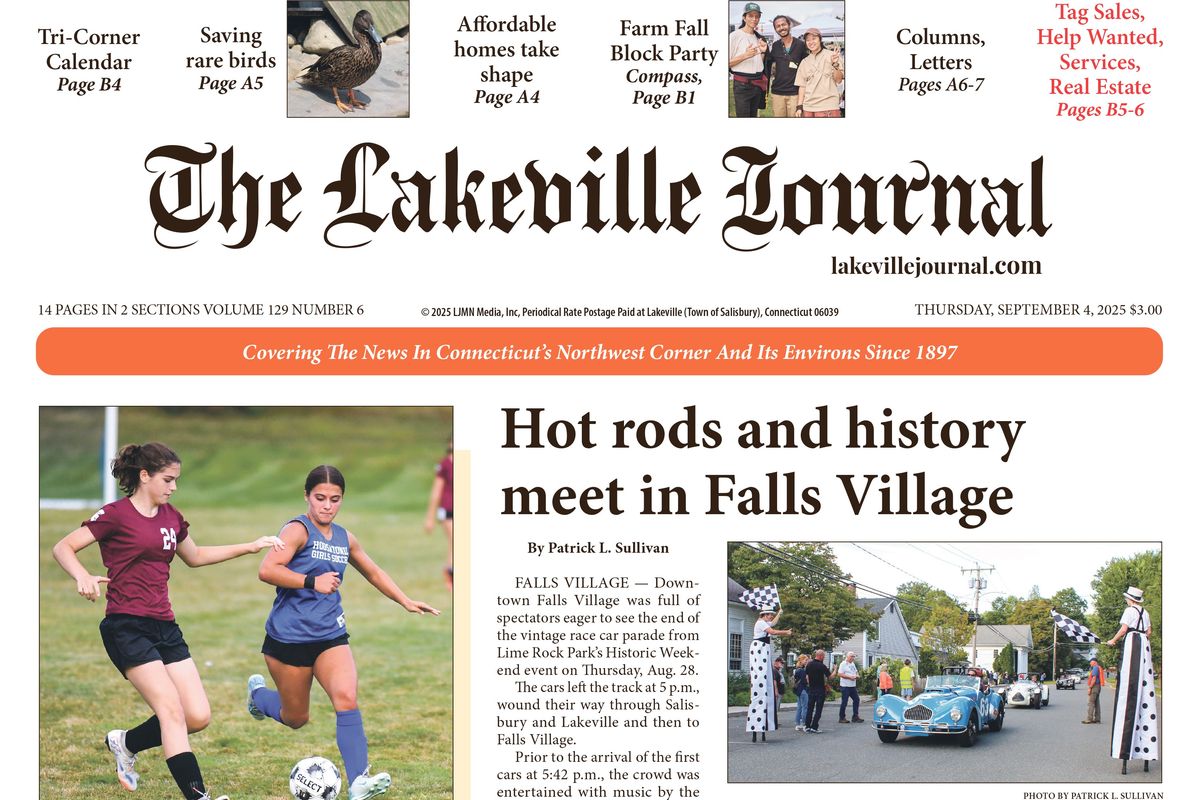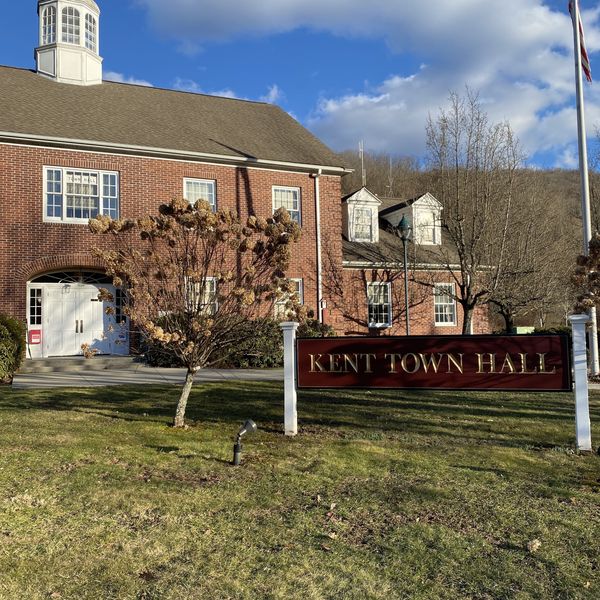Latest News
Undermountain Road in Salisbury was closed the afternoon of Saturday, Sept. 6, as rescue crews worked to save an injured hiker in the Taconic Mountains.
Photo by Alec Linden
SALISBURY — Despite abysmal conditions, first responders managed to rescue an injured hiker from Bear Mountain during a tornado-warned thunderstorm on Saturday, Sept. 6.
“It was hailing, we couldn’t see anything,” said Jacqui Rice, chief of service of the Salisbury Volunteer Ambulance Service. “The trail was a river,” she added.
Just after 3:30 p.m., Rice was positioned back at the station, her uniform spattered with mud from the harrowing mission high on the ridgeline of the Taconic Mountains. “It was really something,” she said with a chuckle as fellow first responders filtered into the station, sharing their own reports of unnavigable roads due to downed trees and powerlines.
Rice said that emergency crews were dispatched at 11:30 a.m. on report of a hiker with an injured left knee on the Appalachian Trail at North Bear Mountain, just south of the Massachusetts border. The victim was unable to walk and needed to be transported off the mountain.
The team gained elevation from Salisbury via Mount Riga and Mount Washington Roads, leaving an ambulance at a location three miles from the hiker. The group travelled as far as possible with ATVs but eventually had to continue on foot due to the “very steep” and rocky terrain.
Rice said conditions were fair during the approach, but when they reached the injured party — “then the weather deteriorated bigtime.” Wind, rain, thunder, lightning and hail made the remainder of the extraction difficult, Rice reported, as they transported the victim via a Stokes litter basket on the slope. Responders deployed ropes to safely transport the victim through the difficult terrain despite the adverse conditions.
Overall, the team consisted of more than 20 members of various regional first response teams. Rice reported that rescuers from Salisbury Volunteer Ambulance, the Lakeville Hose Company, the Northwest Regional Ropes Rescue Team and responders from the state Department of Energy and Environmental Protection made up the mutual aid effort. “Even the ropes team from Amenia, New York came."
Once off the steep terrain, the victim was brought via ATV to the ambulance. Rice said that due to storm damage blocking the roadways, the team left the ATVs at the site and exited the area with the ambulance. The victim was reportedly taken to Sharon hospital in stable condition.
Despite the adverse weather, Rice confirmed that the victim was transported off the mountain safely. Lakeville Hose Company Chief Jason Wilson said that the rescue itself was straightforward despite the conditions, and had wrapped up by 2:30 p.m.
The storm, which was blowing off to the Northeast by then, had wrought havoc across the far Northwest Corner, and as a result had clogged the emergency airwaves in addition to the streets – the Salisbury Volunteer Ambulance Service had to self-dispatch the rescue as the Litchfield County Dispatch was jammed up by extensive emergency calls across the region.
The thunderstorm was one of the strongest of the season. It showed signs of rotation on weather radars, which indicates the possibility of tornado formation. Rotating supercells, of which there were several in the region as a line of strong storms passed through in the mid-afternoon yesterday, are rare in New England. The atmospheric conditions they require to form align only a handful of times per year.
The National Weather Service issued a tornado warning at 1:23 p.m. in Dutchess County for a cell moving northwest. At 1:42 p.m., the NWS reported a storm “capable of producing a tornado” above Ancram, New York, that would impact northwestern Salisbury and part of North Canaan just after 2 p.m.
The line of storms was observed to have produced 60+ mile per hour straight-line winds in several locations across Connecticut and Massachusetts. There have been anecdotal reports from storm chasers and residents of funnels trying to drop from the storm, but without touching down. These sightings have not been corroborated by weather officials.
The NWS confirmed one tornado that touched down near Worcester, Massachusetts later in the day, but has not reported any in the Northwest Corner or surrounding region.
Still, the storm wrought significant impacts across the area, closing Route 44 between downtown North Canaan and the intersection with Belden Street for a short period due to downed wires, as well as a section of Route 41 in Taconic that only reopened Sunday afternoon after a fallen tree was removed.
First responding crews reported Taconic was especially hard hit, with travel in some areas essentially impassable immediately following the storm. Major roadways have since been cleared of blockages.
Keep ReadingShow less
Rock Steady Farm during the 2024 Farm Fall Block Party. This year’s event returns Sept. 6.
Provided
On Saturday, Sept. 6, from 12 to 5 p.m., Rock Steady Farm in Millerton opens its fields once again for the third annual Farm Fall Block Party, a vibrant, heart-forward gathering of queer and BIPOC farmers, neighbors, families, artists, and allies from across the Hudson Valley and beyond.
Co-hosted with Catalyst Collaborative Farm, The Watershed Center, WILDSEED Community Farm & Healing Village, and Seasoned Delicious Foods, this year’s party promises its biggest celebration yet. Part harvest festival, part community reunion, the gathering is a reflection of the region’s rich agricultural and cultural ecosystem.
Rooted in justice and joy, the event will feature over 25 local vendors and organizations, live performances, healing workshops, family-friendly activities (yes, there’s a bouncy castle), and abundant local food. And while the festivities are certainly reason enough to show up, organizers remind us the purpose runs deeper.
“This isn’t just a party. It’s a place to build the kind of relationships that keep our food system alive,” said Maggie Cheney, Rock Steady’s co-founder and worker-owner. “We’re creating space where farmers, growers, families, and community organizers can connect, celebrate, and support one another.”
Proceeds from the event support Rock Steady’s POLLINATE program for queer and trans BIPOC beginning farmers, as well as Catalyst Collaborative Farm’s food justice initiatives. With sliding-scale tickets from $5 to $250, the organizers aim to make the event accessible to all, including free entry for children under 12 and volunteer options for those who want to pitch in.
For those who’ve attended before, it’s a welcome return. For newcomers, it may just feel like coming home.
More info and tickets: rocksteadyfarm.com/farm-block-party
Keep ReadingShow less
The art of Marilyn Hock
Sep 03, 2025
Waterlily (8”x12”) made by Marilyn Hock
Provided
It takes a lot of courage to share your art for the first time and Marilyn Hock is taking that leap with her debut exhibition at Sharon Town Hall on Sept. 12. A realist painter with a deep love for wildlife, florals, and landscapes, Hock has spent the past few years immersed in watercolor, teaching herself, failing forward, and returning again and again to the page. This 18-piece collection is a testament to courage, practice and a genuine love for the craft.
“I always start with the eyes,” said Hock of her animal portraits. “That’s where the soul lives.” This attentiveness runs through her work, each piece rendered with care, clarity, and a respect for the subtle variations of color and light in the natural world.
After painting in oils earlier in life, Hock returned to art when she retired from working as a paralegal with a goal: to learn watercolor. It wasn’t easy.
“Oils and watercolor are opposites,” she explained. “With oils, you build your darks first. In watercolor, if you do that, you’re in trouble.” She studied online, finding instructors whose approach clicked, and adapted to the delicacy of the medium.
“When I’m working, everything else falls away,” she said. “It doesn’t matter what’s going on in life. While I’m painting, time disappears.”
Her studio, formerly a home office, is now her sanctuary and the pieces in this exhibition are the result of three years of that devoted studio work. While this is her first full public show, Hock previously tested the waters at a small fundraiser at Noble Horizons, where one of her pieces sold. That experience — and the consistent encouragement from her family, especially her husband — pushed her to pursue a full exhibition. With gentle encouragement from her husband and family, Hock reached out to the Town Hall’s curator, Zelina Blagden. “My husband kept saying, ‘You’re as good as all those other people out there, why not show your work?’” And so, here it is.
All paintings in the show are for sale, though Hock admits a few are priced high — not because of their size or complexity — but because she’s not quite ready to let them go. “There are a couple I’ve priced high because I’m not sure I want to part with them. But we’ll see,” she laughed. “It would be nice to support the habit a little bit.”
As for aspiring artists or anyone hesitating to begin something creative, Hock’s advice is simple: “Go for it. If it fails, toss it in the basket and start over.”
The exhibit will be on view at Sharon Town Hall through Oct. 31 with an opening reception on Sept. 12 from 5:30 to 7:30 p.m. Light refreshments will be served.
Keep ReadingShow less
loading












